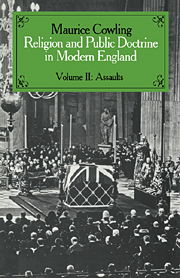Book contents
- Frontmatter
- Foreword
- Contents
- Projected contents of Volume III (for publication c. 1988–90)
- INTRODUCTION
- I THE ASSAULT ON THE EIGHTEENTH CENTURY
- II THE ASSAULT ON CHRISTIANITY
- III THE ASSAULT ON CHRISTIANITY IN THE TWENTIETH CENTURY
- 8 The Revision of Ethical Earnestness I
- 9 The Revision of Ethical Earnestness II
- 10 The Revision of Ethical Earnestness III
- IV ASSAULTS ON THE ASSAILANTS
- CONCLUSION: ASSAULTS AND ACCOMMODATIONS
- Notes
- Index of main names
9 - The Revision of Ethical Earnestness II
Published online by Cambridge University Press: 23 December 2009
- Frontmatter
- Foreword
- Contents
- Projected contents of Volume III (for publication c. 1988–90)
- INTRODUCTION
- I THE ASSAULT ON THE EIGHTEENTH CENTURY
- II THE ASSAULT ON CHRISTIANITY
- III THE ASSAULT ON CHRISTIANITY IN THE TWENTIETH CENTURY
- 8 The Revision of Ethical Earnestness I
- 9 The Revision of Ethical Earnestness II
- 10 The Revision of Ethical Earnestness III
- IV ASSAULTS ON THE ASSAILANTS
- CONCLUSION: ASSAULTS AND ACCOMMODATIONS
- Notes
- Index of main names
Summary
‘The leading principle of the Utopian religion is the repudiation of the doctrine of original sin: the Utopians hold that man, on the whole, is good. That is their cardinal belief. Man has pride and conscience … he has remorse and sorrow in his being. How can one think of him as bad? He is religious; religion is as natural to him as lust and anger, less intense, indeed, but coming with a wide-sweeping inevitableness … And in Utopia they understand this, or, at least, the Samurai do, clearly. They accept Religion as they accept Thirst, as something inseparably in the mysterious rhythms of life.’
H. G. Wells A Modern Utopia 1905 (Nelson Popular Editions of Notable Books n. d.) pp. 288–9.‘Our supreme business in life – not as we made it, but as it was made for us when the world began – is to carry and to pass on as we received it, or better, the sacred lamp of organic being that we bear within us. Science and morals are subservient to the reproductive activity; that is why they are so imperative. The rest is what we will, play, art, consolation – in one word religion. If religion is not science or morals, it is the sum of the unfettered expansive impulses of our being … the stretching forth of our hands towards the illimitable. It is an intuition of the final deliverance, a half-way house on the road to that City which we name mysteriously Death.’
Henry Havelock Ellis, The New Spirit 1890 (Modern Library edition) pp. 291–2.- Type
- Chapter
- Information
- Religion and Public Doctrine in Modern England , pp. 212 - 246Publisher: Cambridge University PressPrint publication year: 1985

